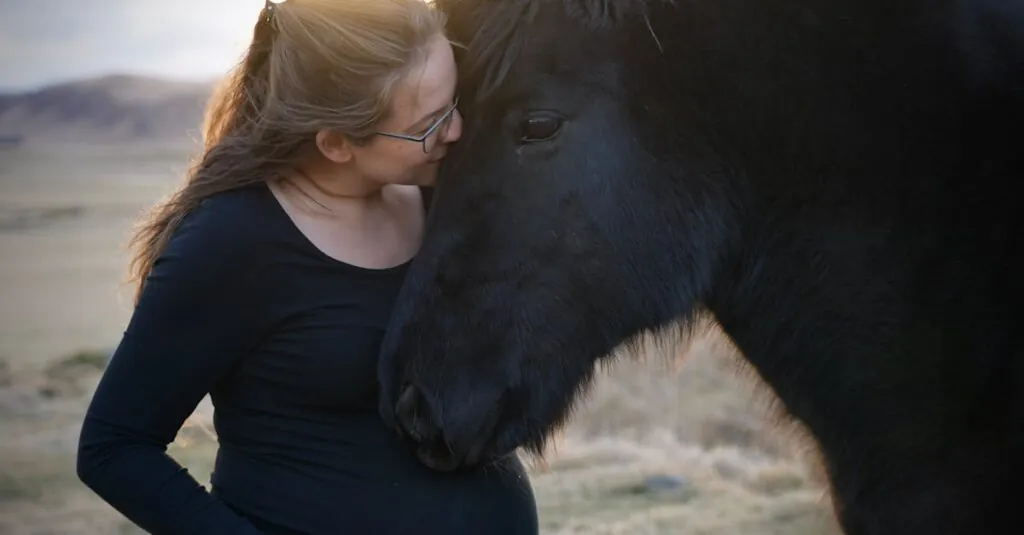Table of Contents
ToggleWhen it comes to horse pregnancy, it’s a wild ride—literally! Imagine a majestic mare, her belly growing rounder by the day, as she prepares to bring a tiny foal into the world. It’s not just about the adorable baby horses; it’s a fascinating journey filled with unique challenges and surprises.
Understanding Horse Pregnancy
Horse pregnancy encompasses various stages, each marked by distinct physical and behavioral changes in the mare. This process involves the mare preparing for the arrival of her foal.
The Gestation Period
The gestation period for horses typically lasts about 11 months, with a range of 320 to 380 days. Most mares deliver their foals in the spring or early summer, aligning with favorable environmental conditions. Variability exists, as factors such as breed and individual health impact gestation length. Shorter pregnancies can occur in some cases, while others may extend towards the maximum. Generally, horses carrying twins face increased risks, including complications during birth. Regular veterinary check-ups during this time ensure proper monitoring of the mare’s health and foal development.
Signs of Pregnancy in Mares
Recognizing signs of pregnancy in mares can help in providing timely care. Early indicators include changes in appetite and behavior; often, mare’s will display increased lethargy. Swelling in the udder may occur a few months into the pregnancy; developing an enlarged belly signifies foal growth. Some mares exhibit mood swings as they adapt to the hormonal changes. Routine veterinary examinations, including ultrasounds, provide definitive confirmation of pregnancy around 14 to 16 days post-breeding. Observing these signs allows owners to adjust care accordingly, ensuring both mare and foal remain healthy throughout the pregnancy.
Care During Pregnancy
Mares require specific care to ensure healthy pregnancies. Attention to nutritional needs and veterinary care plays a significant role.
Nutritional Needs
Providing balanced nutrition is crucial during pregnancy. A mare’s diet must include high-quality forage such as hay and pasture, which ensures adequate fiber intake. Including grain and fortified feed promotes additional energy and essential nutrients. Also, consider supplements that contain vital vitamins and minerals. Iron, calcium, and phosphorus support fetal development. Monitoring her body condition score regularly helps maintain her weight. If changes occur, adjust her diet accordingly to prevent deficiencies.
Veterinary Care
Regular veterinary check-ups are vital throughout pregnancy. A veterinarian should perform routine examinations to assess the mare’s health and the foal’s development. Scheduling ultrasounds allows for monitoring of fetal growth and identification of potential complications. Vaccinations and deworming should follow a veterinarian’s recommended schedule to protect the mare and foal. Recognizing signs of distress, such as abnormal behavior or appetite changes, warrants immediate veterinary consultation. Timely interventions can significantly affect outcomes for both mare and foal.
Gestation Complications
Gestation complications can arise during horse pregnancy, affecting both the mare and foal’s health.
Common Issues
Dystocia, or difficult birth, frequently occurs in cases of mispositioned foals. A mare may experience retained placenta, which can lead to severe infection. Other complications include twin gestations, often resulting in underdeveloped foals. Abortion can occur due to infectious diseases like equine viral abortion or environmental stress. Mares may also face laminitis, a painful hoof condition that requires prompt attention. Regular vet consultation helps detect these issues early.
Prevention Strategies
Maintaining proper nutrition plays a crucial role in preventing complications. A mare’s diet should include high-quality forage and balanced grain. Providing essential supplements ensures she receives necessary vitamins and minerals. Regular exercise promotes good circulation and overall health. Stress reduction is vital during pregnancy; a calm environment promotes a smoother gestation. Implementing a consistent veterinary check-up schedule ensures timely vaccinations and deworming, reducing infection risks. Early monitoring can identify signs of distress, allowing for prompt intervention.
Preparing for Foaling
Foaling requires thorough preparation to ensure the mare and foal’s health. Specific needs arise as the foaling period approaches, emphasizing the importance of a well-planned environment.
Essentials for Foaling
Foaling kits play a crucial role in preparations. These kits typically include sterile towels, iodine for umbilical care, and a halter. A clean, dry area for delivery promotes safety and comfort. Numerous mares prefer to foal alone, thus ensuring a quiet space minimizes stress. Consider arranging some lighting to assist during nighttime births. Keeping contacts for a veterinarian accessible can facilitate quick assistance if complications arise. Regular assessment of the mare’s body condition ensures readiness for foaling.
Signs of Approaching Birth
Physical changes signal the approaching birth date. Increased udder development, often referred to as “bagging up,” indicates lactation readiness. A mare may exhibit restlessness or change in appetite as labor nears. She might also separate from companions, seeking solitude before foaling. Monitoring the mare closely, especially in the last few weeks of pregnancy, proves essential. Relaxed ligaments around the tailhead signal imminent labor; this change occurs in the final days. Recognizing these signs aids owners in preparing for on-time assistance during foaling.
Horse pregnancy is a remarkable journey that requires careful attention and preparation. Understanding the various stages and challenges can help owners provide the best care for their mares and foals. Proper nutrition regular veterinary check-ups and a calm environment play crucial roles in ensuring a healthy pregnancy.
As the foaling period approaches recognizing the signs of impending labor is vital for timely assistance. By staying informed and prepared owners can support their mares through this transformative experience. With the right care and attention both mare and foal can thrive in this exciting new chapter.







